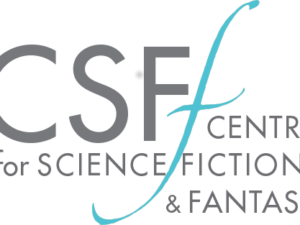
This week’s PhD Student Profile is of Powder Thompson.
Tell us about your research!
My research revolves around the trope of the Goblin Market in fantastic fiction. Also known as a Bazaar of the Bizarre, a Goblin Market is a place where one can buy just about anything, for a similar price. If you’ve read/seen Neil Gaiman’s Stardust, the Market at Wall is one example. At the Goblin Market you can buy things such as beauty, or luck, or seven years of prosperity, for prices as varied as your voice, every memory you have from before the age of three, or your shadow. One almost always sees something they want gracing the market stalls, but almost always leaves with what one needs, instead.
I’ve been looking at examples in all manner of fictional media (books, movies, graphic novels, etc.) and researching folkloric mentions of fairy commerce. The folkloric references are wonderfully contradictory. Where one place might record that fairies are nothing but thieves, prone to taking whatever catches their eye without payment, another holds that fairies are actually very good customers, always leaving the exact right coinage to purchase anything they might take a fancy to. The folklore also has strong examples of fairies trading in ephemera (things which cannot be touched, held, or packaged, yet we have very real conceptions of). One clever young man manages to trade with a fairy for the skill of a master carpenter, for example.
What was your introduction to SFF?/How did you come to SFF?
I’ve been reading SFF long enough that I can no longer remember which book, precisely, started me off. I’d like to say that it was The Dark is Rising by Susan Cooper. It was certainly in the library (the closest bookstore was over 120 miles away from where I grew up). That I can remember it is a strong argument in its favour. But I can’t say for certain that it was. I know definitively that I found and read The Hobbit when I was 11. The internet had not yet spread to my corner of Mid-Western America, so most of my book discoveries were limited to what was already in the library or what I managed to find on those very rare occasions my parents travels allowed me access to a bookstore.
Once I did have access to the internet, and, a bit later, online book shopping, my reach extended a great deal. Tolkein and Lewis gave way to Eddings, Lackey, and Zelazny. Eddings brought me to Dunsany, and probably did more to influence my sense of humour than anyone in my family did. Lackey introduced me to the Society for Creative Anachronism and Renaissance Faires (though I wouldn’t get to explore either until University). Zelazny brought me to ’zines and tabletop roleplaying games, and of the three is probably the most foundational text for the matrix of stuff that’s inside my head.
What does SFF do for you that other genres do not?
SFF asks ‘What If?’ better than any other genre out there. At its best, SFF shows us the worlds that should be, and can be, rather than the oft-disappointing world-that-is. It allows children to be heroes, and outcasts to change the world for the better. Because SFF is so radical in its world building it is uniquely suited to question the very foundations of our humanity in a way that other forms of literature are not. Realistic fictional genres are by their very nature tied to life (and political and economic systems) as we know/have them. They can question those systems, and critique them, but are limited in imagining better ones.
Plus, let’s be honest, nothing in realistic fiction is anywhere near as awesome as dragons, talking swords, or fireball spells. The rule of cool is not to be underestimated.
Where do you see SFF going in the next 10 years? 20 Years?
I think over the next two decades we’re going to see a greater and greater influx of fantasy influenced by the myths and mythologies of other cultures, increasingly from own-voices authors. Science fiction will continue to springboard off developing technologies to imagine greater and greater technological marvels and horrific dangers. In the near future, I think we’ll continue to see a lot of optimistic fiction (because the real world is tilting rather swiftly toward the dark side) and won’t see any kind of large resurgence of interest in subgenres like grimdark and dystopia until things get better and stay better for a few years.
What overlooked or lesser known works would you recommend to readers and academics and why?
Enchanter by Robin W. Bailey: It has a gay dragon, in 1989. That alone really left an impression on me.
Gossamer Axe by Gael Baudino: The late 1980s really, really loved its fusion of Rock Music and Magic. In my opinion, this is one of the best, if not the best, books to do ‘the Power of Rock’ as musical magic.
The Castle Perilous books by John DeChancie: An excellent example of portal fantasy for adults, with a good dose of humour and an overdose of adventure.
The Wizard of 4th Street by Simon Hawke: I’m just going to continue recommending things from the 1980s because why not? Arthurian legend, the modern world remade with magic rather than fossil fuels as a power base, and undying necromancers who draw unspeakable power from human sacrifice. Plus a talking broom that’s fluent in Yiddish.
Ruby, The Galactic Gumshow by the ZBS Foundation: This is comprised of several audio dramas and is some of the best sci-fi noir I’ve ever encountered, complete with deep philosophical underpinnings, sharp political satire, fantastic voice acting, and a slew of off-colour jokes and clever lampoonings of various sci-fi tropes. In my opinion the third series, Ruby 3: The Underworld/The Invisible World, is the best, but that is, as I said, just my opinion.
Doctor Mordrid: This film is the height of early 90s cheese. It’s a trans-dimensional romp involving a search for the Philosopher’s Stone, a lot of really really wanting to be a Doctor Strange movie, and a reanimated T-Rex throwing down with a reanimated Woolly Mammoth.
Kilroy Was Here by Styx: Rock concept album revolving around a dystopic future theocratic fascist state that has outlawed music. A lot of people know ‘Mr. Roboto,’ but I don’t feel enough know it was part of an entire concept album (which turns into a pretty awesome stage show, if done right).
Read Powder’s (writing as Trip Galey) take on Our Top 10 LGBTQ+ SFF Icons over at Hodderscape. For more information about Powder and his publications, you can visit his bio on the Members page.



